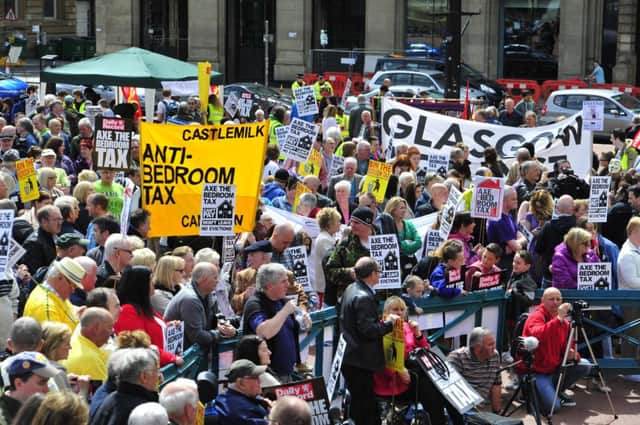Leaders: Bedroom tax agreement in national interest


And yet that is what we witnessed in the Scottish Parliament yesterday when Labour supported an SNP budget that contained new money to offset the effects of the hated “bedroom tax”.
In addition there was agreement that both parties will work at local authority level to ensure no social housing tenant will face eviction as a result of a tax which has become, for many people, a 21st century poll tax.
Advertisement
Hide AdAdvertisement
Hide AdThis newspaper long ago put on record its opposition to the bedroom tax – a Dickensian imposition on private life that dictated to families the sleeping arrangements of their children, and was a particularly cruel blow for households where one or more member was disabled or infirm. That this has now been neutered is a cause for celebration.
Inevitably there were those in both parties last night trying to claim sole credit, accusing the other of a “u-turn” that finally made agreement possible.
We should draw a veil over such claims. This, instead, is a moment for all to savour. It is also, if we may venture a tentative hope, a sign of how Scottish politics is capable of operating when Labour and the SNP are not locked in a perpetual death grip with their hands tightly around each other’s throats.
The SNP’s agreement to this plan is a significant move in the context of the referendum. Only a few months ago the Yes campaign was arguing that the only way to protect Scotland from the tax was to vote Yes.
This has subsequently been shown not to be the case. Holyrood has now ameliorated the effects of the tax. Additionally, Westminster government sources have indicated that power over housing benefit could be devolved to Scotland in the event of a No vote in September.
The SNP will still be able to argue that a policy such as the bedroom tax would be highly unlikely in an independent Scotland. But yesterday’s actions may have diminished the use of the tax as a political weapon in the referendum.
Labour’s guns have also been somewhat spiked. No longer can they claim Scotland is “on pause” while the SNP government concentrates on constitutional issues.
So, honours even. But can we expect more of the same? In Germany, Angela Merkel last year formed a grand coalition with the social democrats, her traditional rivals. It has a produced an impressive government of national unity.
Advertisement
Hide AdAdvertisement
Hide AdIs it possible to envisage such an outcome in Scotland, with the best minds of both SNP and Labour working together in the national interest? Perhaps, in the current climate, that is rather too much to ask. But it is a beguiling thought.
UN report puts Pope in hot seat
ACCUSATIONS do not come much more damning than the United Nations’ new report into the Vatican’s handling of the Catholic Church’s child sex abuse scandals.
According to a UN human rights committee, senior Vatican officials “systematically” created a climate within the church that allowed priests to rape and molest tens of thousands of children with impunity.
The report challenges the Vatican to undertake a radical culture change to ensure any clergy suspected of abuse do not escape justice, and to act to prevent further cover-ups. And it demands changes to canon law to allow abortion in specific circumstances; and to allow Catholic schools to teach about contraception, to help the fight against HIV and Aids.
The Vatican is used to criticism, but not on this scale and from such an authoritative quarter. As such, the UN report represents perhaps the greatest challenge to the still-nascent papacy of Pope Francis.
This pope has been a revelation. His liberal attitude has shocked conservative clergy and laity who had become used to the Vatican taking a firmly orthodox view on doctrinal matters. Francis’s insistence on a “church for the poor” and his declaration that the Vatican needed to put less emphasis on a proscriptive view of sex and sexuality have shocked – or delighted – those on differing wings of the church.
But Francis has so far not been called upon to wrestle with the legal and institutional vested interests of the Vatican establishment, at whom this report is primarily aimed.
This challenge – and not his warm words, big smiles and humility – may be how Francis is ultimately judged.